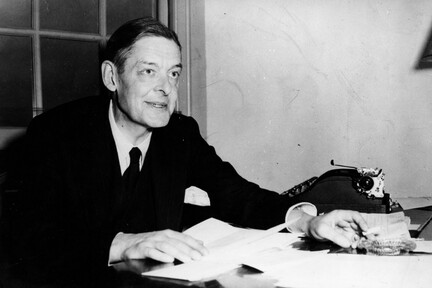On Eliot – Seamus Perry in TLS:
‘“If the situation is hopeless, then the continuation of anything like The Criterion served no purpose except to disguise the hopelessness”, as he wrote to one correspondent. But as the storm clouds continued to gather, he had more than enough to occupy him: he continued to nurture the extraordinarily starry poetry list he had built up at Faber and to work on many other titles besides; his new play The Family Reunion was staged in March and published shortly afterwards; and he gave a weighty lecture series in Cambridge which would be published as The Idea of a Christian Society in the autumn, just a few days after the somewhat less weighty Old Possum’s Book of Practical Cats.
By the time that odd pairing of titles had appeared on the Faber list, war had broken out and Eliot, like everyone else, was abruptly adjusting to a new life of blackouts, air raid warnings and shortages – of which the shortage of paper was, for a publisher, not the least testing. He enrolled as a trainee Air Raid Precaution warden and endured long lectures about stirrup pumps, though the main lesson he passed on to John Hayward was less technical: “The first thing to do, when you hear the Syrens, or the gun fire preliminary … is to have a good Piss: after that you are ready for the Jerry”. His letters to Hayward, which form the largest single correspondence in the book, are full of this sort of rogueish and fantastical humour, which feels like the spirit of the age: “I believe that what we are to do now is to keep our chins up”, as Eliot wrote with glum humour to John Betjeman.’
(…)
‘This voice, at once arch and kindly, could sharpen into something more judgemental: “I look forward to reading your work at a point at which it will have escaped from the influence of Yeats”, he wrote to Vernon Watkins, adding “as well as that of everyone else”. Responding to a manuscript from the young Norman Nicholson, Eliot ventured: “My own belief is that you would do best to put this book into cold storage for a time, and start fresh on something else”. Nicholson admitted to being taken back by the severity of the criticism, “but”, he said gamely, “I expect I’ll recover eventually”. Sometimes these assessments allow a fascinating glimpse at Eliot’s sense of his own development. To Mervyn Peake he writes: “You speak in several poems of singing, but I think the first thing a poet needs to learn is how to talk”. ‘
(…)
‘The text has previously been superbly edited by Christopher Ricks as Inventions of the March Hare (1996), which was the title that Eliot himself gave the notebook; but this enterprising and extremely handsome book from Galileo Publishers gives us something of the charisma of the handwritten page to accompany that edition, and allows us to contemplate once again the dazzling young American poet whom no one could possibly have imagined would have gone on, in wartime England, to write the greatest verse of the home front.’
Read the article here.
The poet should talk first and sing later. I would like to add, sometimes talking is enough.
Also, war is adjusting to a new life, and many of our endeavors are just disguising hopelessness. But that’s okay.
And 2022 is a good year to read or reread The Waste Land.
